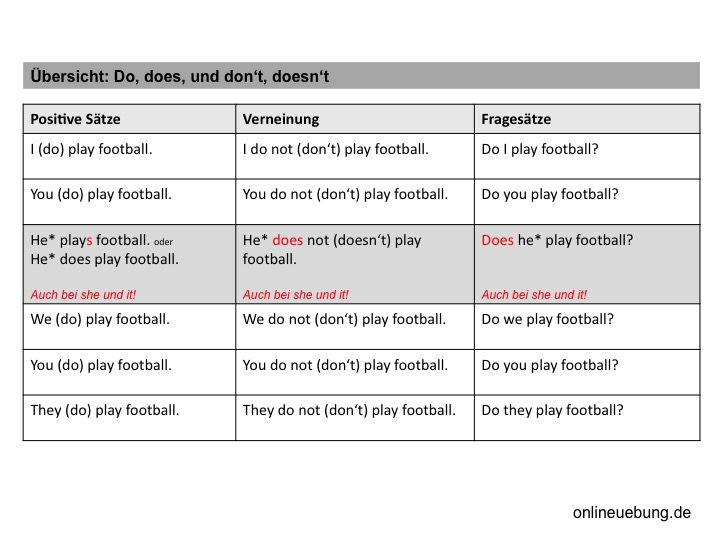Hilfsverben: do, does, don’t, doesn’t
Wann verwendet man die Hilfsverben: do, does, don’t, doesn’t?
Regeln
Im Englischen Simple Present verwendet man bei
-
- positiven Sätzen optional
-
- ‚do‘
-
- ‚does‘ (nur bei der 3. Person Singular (he, she, it))
-
- Onlineübung: Wähle aus
-
- positiven Sätzen optional
-
- verneinten Sätzen oder Fragen ein Hilfsverb:
-
- ‚do not‘ oder ‚don’t‘
-
- ‚does not‘ oder ‚doesn’t‘ – bei der 3. Person Singular (he, she, it)
-
- Übung zu Fragesätzen: Wähle aus
-
- Übung zu verneinten Sätzen: Wähle aus
-
- verneinten Sätzen oder Fragen ein Hilfsverb:
Achtung: Wenn man ‚do‘ als Hilfsverb verwendet, entfällt das ’s‘ beim folgenden Verb bei der 3. Person Singular (he, she, it).
-
- He likes the game. (Er mag das Spiel.)
- He does like the game. (Er mag das Spiel sehr wohl.)
Übersicht

Beispiele
Positive Sätze mit ‚do‘
Bei positiven Sätzen ist die Verwendung von ‚do‘ optional. Der Satz funktioniert auch ohne ‚do‘. Man verwendet ‚do‘, wenn man die Aussage betonen möchte.
-
- I go to the movies with the others. (Ich gehe mit den anderen ins Kino.)
-
- oder, wenn man betonen möchte, dass man geht:
-
- I go to the movies with the others. (Ich gehe mit den anderen ins Kino.)
-
- I (do) go to the movies with the others. (Ich gehe mit den anderen ins Kino.)
-
- He goes to the movies with the others. (Er geht mit den anderen ins Kino.)
-
- oder, wenn man betonen möchte, dass er geht:
-
- He goes to the movies with the others. (Er geht mit den anderen ins Kino.)
-
- He does go to the movies with the others. (Er geht mit den anderen ins Kino.)
-
- I play the piano. (Ich spiele Klavier.)
-
- oder, wenn man betonen möchte, dass man Klarvier spielt:
-
- I play the piano. (Ich spiele Klavier.)
-
- I (do) play the piano. (Ich spiele Klavier.)
-
- She plays the piano. (Sie spielt Klavier.)
-
- oder, wenn man betonen möchte, dass sie spielen (kann):
-
- She plays the piano. (Sie spielt Klavier.)
-
- She does play the piano. (Sie spielt Klavier.)
-
- I like colorful flowers. (Ich mag bunte Blumen.)
-
- oder, wenn man betonen möchte, dass man bunte Blumen mag:
-
- I like colorful flowers. (Ich mag bunte Blumen.)
-
- I (do) like colorful flowers. (Ich mag bunte Blumen.)
-
- He likes colorful flowers. (Er mag bunte Blumen.)
-
- oder, wenn man betonen möchte, dass er bunte Blumen (doch) mag:
-
- He likes colorful flowers. (Er mag bunte Blumen.)
-
- He does like colorful flowers. (Er mag bunte Blumen.)
Negative Sätze
-
- I don’t go to the movies with the others. (Ich gehe nicht mit den anderen ins Kino.)
-
- He doesn’t go to the movies with the others. (Er geht nicht mit den anderen ins Kino.)
-
- I don’t play the piano. (Ich spiele nicht Klavier.)
-
- He doesn’t play the piano. (Er spielt nicht Klavier.)
Fragesätze
-
- Do I go to the movies with the others? (Gehe ich mit den anderen ins Kino?)
-
- Does he go to the movies with the others? (Geht er mit den anderen ins Kino?)
-
- Don’t I go to the movies with the others? (Gehe ich nicht mit den anderen ins Kino?)
-
- Doesn’t he go to the movies with the others? (Geht er nicht mit den anderen ins Kino?)
-
- Do I play the piano? (Spiele ich Klavier?)
-
- Does he play the piano? (Spielt er Klavier?)
Übungen zur Verwendung der Hilfsverben: do, does, don’t, doesn’t

